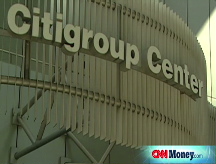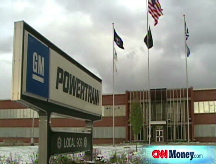Why Citigroup got Detroit's money
The government wants the Big Three to prove they are worthy of a $25 billion loan but Citigroup didn't have to twist any arms to get another $20 billion.

 |
| Shares of Citigroup and GM have both lost most of their value in the past year. But while Citigroup has already received government funding, GM is still waiting for assistance. |
NEW YORK (CNNMoney.com) -- Poor Detroit. The heads of the Big Three automakers had to subject themselves to two days of Congressional grilling last week while they begged for a $25 billion loan.
And what did General Motors (GM, Fortune 500), Ford (F, Fortune 500) and Chrysler get? Nothing. Nada. Zilch.
They were told to go home and write up a viable business plan and to show that they wouldn't be coming back for more money a year down the road. (Adding insult to injury, Motown's hapless football team, the Detroit Lions, is still searching for its first victory. Ouch.)
Meanwhile, Citigroup (C, Fortune 500), which just a month ago received $25 billion, had no trouble securing another $20 billion Sunday night. CEO Vikram Pandit didn't even have to fly his jet to Capitol Hill with hat in hand. (And oh yeah: the two New York football teams are a combined 18-4, with the Jets on Sunday upsetting the previously undefeated Titans. The Giants are also the defending Super Bowl champs. Go Big Blue!)
Why the apparent unfairness?
Daniel Alpert, managing director of Westwood Capital, an investment bank in New York, said that saving a bank like Citigroup has to take precedence over the auto industry.
Even though a collapse of one or more of the Big Three could have major negative implications on the economy, particularly the unemployment rate, he said preventing a Citigroup bankruptcy could forestall an even worse shock to the already fragile financial system.
"This is dramatically different. Essentially, what the government needed to do is under no circumstances allow Citigroup to fail. You can't have a financial world without the major banks," he said.
David Resler, chief economist with Nomura Securities International, added that he thinks bankruptcy could be an option for the Big Three whereas a bankruptcy for a bank would mean liquidation, similar to what happened with Lehman Brothers in September.
And that is not something he thinks the government would allow to happen.
"Citi stands at the center of the financial system. It's a huge company whose relations are intricately woven throughout the entire economy. The intent is shoring up the system in this near-term crisis, not necessarily one company," Resler said.
Sure, there are some who argue that bankruptcy for an automaker would also be its death knell. But even if one or more of the Big Three go away, some suggest that the government may allow this simply because the Big Three deserves to fail because of decades of mistakes.
"There is nothing that Detroit has done in the past 20 years to gain any support from Washington or the public," said Bob Andres, chief investment strategist for Portfolio Management Consultants, the investment consulting unit of Chicago-based asset management firm Envestnet, which has $90 billion in assets.
"There has to be an end. The government can't own everything in the country. They may have to draw a line and unfortunately Detroit may be it," he added.
Still, it's not as if Citigroup also didn't make serious mistakes. And some argue that the guarantee of future loan losses may have been sufficient to prove to the market that Citigroup wouldn't fail and there was not really a need to give the bank even more cash.
"I'm a bit dumbfounded as to what the urgency was," said Keith Hembre, chief economist with First American Funds in Minneapolis.
Still, strange as it may seem, it's politically easier to deny Detroit than Wall Street. The Big Three is being singled out as the poster child for mismanagement and is being forced to jump through hoops to get money while the banks don't have to do much other than moan about short sellers targeting their stock to get more funding.
At the end of the day, Alpert said that there are so many companies lining up for assistance, the government is going to have to prioritize and at least give the appearance that it isn't giving out cash willy-nilly.
"Washington is Oz right now. Everybody is marching in asking for a heart, a brain or a lot of cash," he said. "What Congress told the Big Three is to go back and bring them the broom of the Wicked Witch of the West." ![]()



